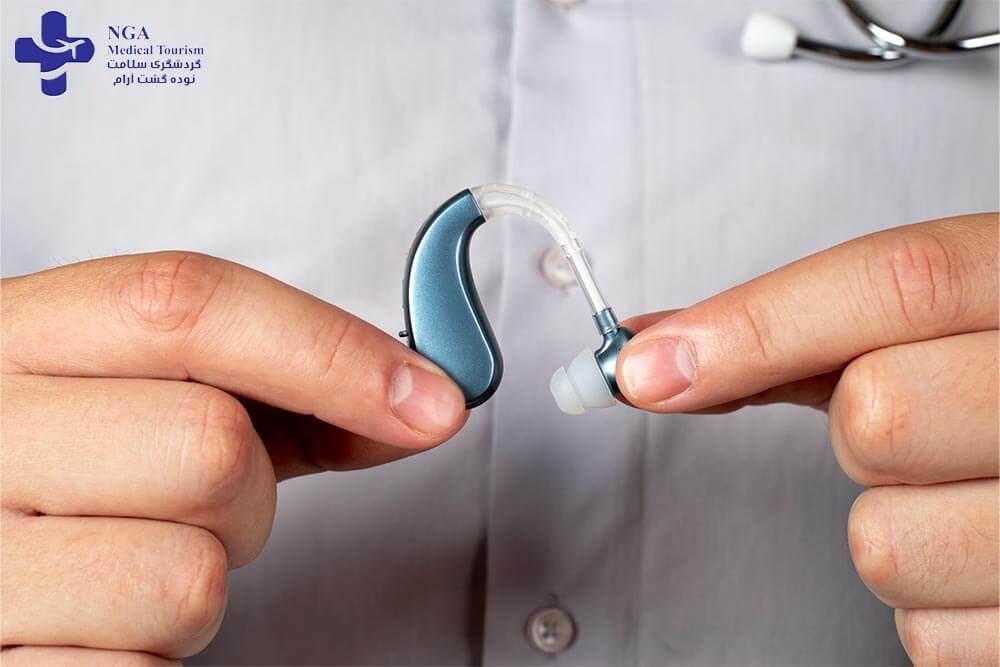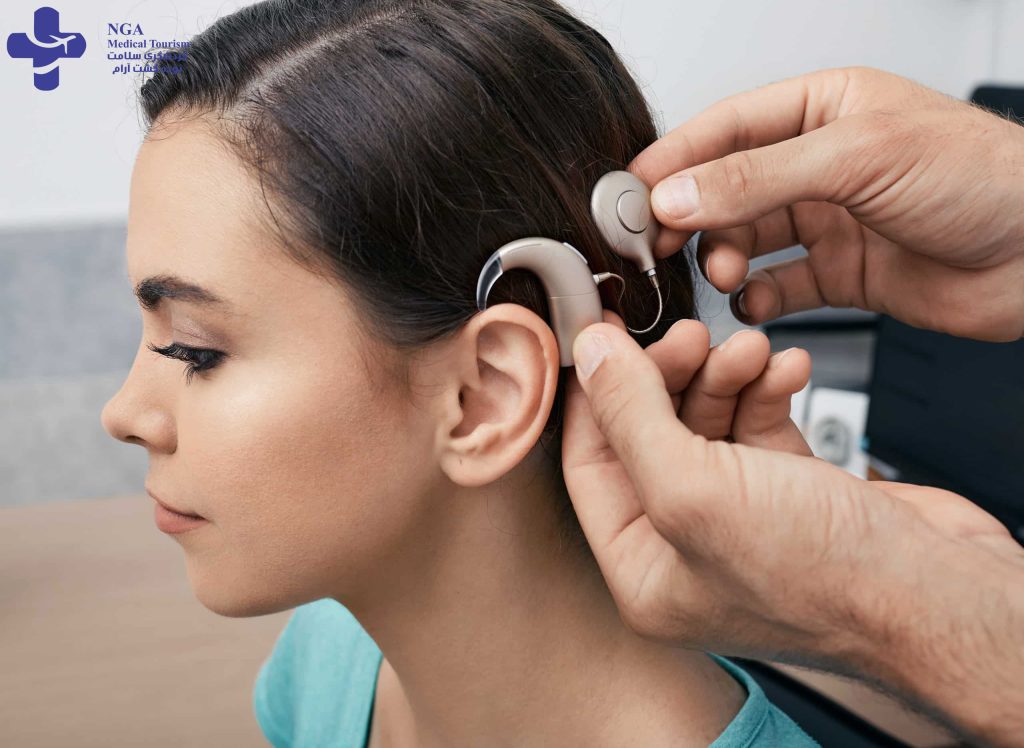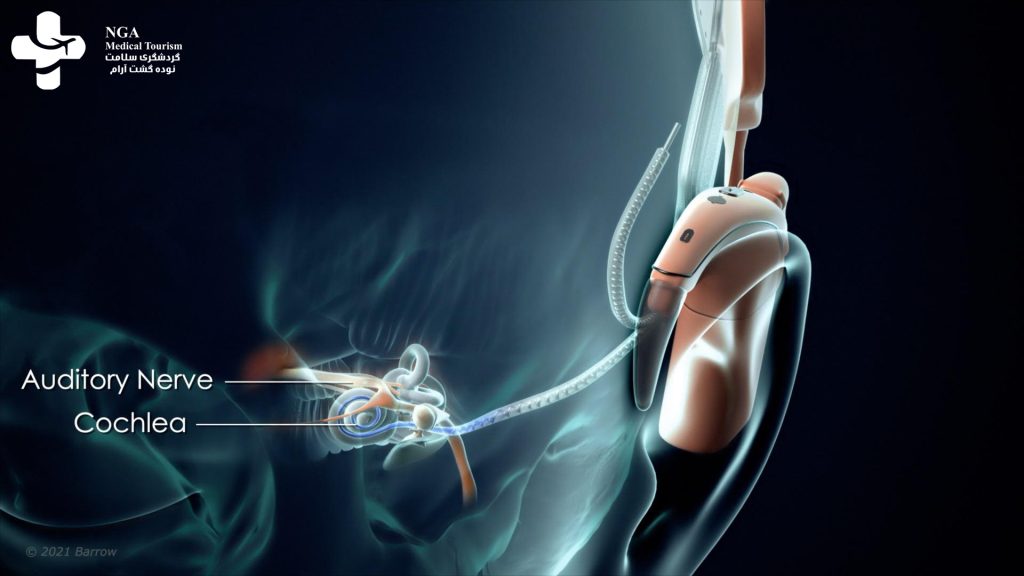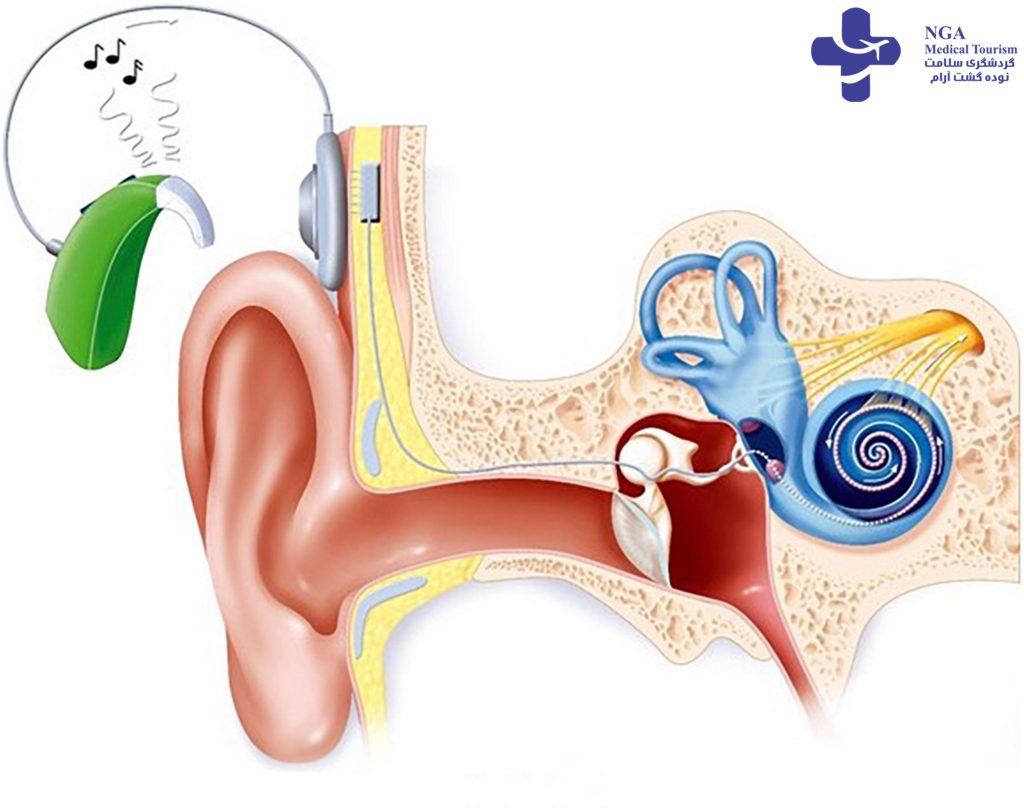All Departments
- Aortic valve stenosis (Aortic stenosis)
- arteriovenous malformations
- Avascular Necrosis
- Best cosmetic dentistry in Iran| Dental Treatment in Iran
- Breast Augmentation in Iran|Breast implant in iran
- Breast Reduction surgery
- Cancer in Iran: oncology in Iran
- Cardiology
- Cataract surgery in Iran
- Cochlear Implant Surgery in Iran
- Cosmetic Laser
- Cosmetic Surgery
- Ear cosmetic surgery
- Eye Care
- Eyelid surgery (Blepharoplasty)
- General Heart Surgery in Iran
- General surgery in Iran
- Glaucoma Treatment In Iran
- Hair Transplant
- Heart valve surgery
- lasik Eye Surgery
- Liposuction
- Non-Surgical Cosmetic procedures in iran
- Organ Transplantation in Iran
- Orthopedic
- Paget disease of bone
- Pediatrics
- Plastic surgery
- Psychiatry
- Radiology
- Rhinoplasty surgery in iran
- Shoulder Replacement Surgery
- SkinCare Treatment
- Spinal cord injury
- urolithiasis procedure in iran
- Urology
- Varicocelectomy
Opening Hours

Cochlear Implant Surgery in Iran
Cochlear implant surgery is a medical procedure that involves implanting an electronic device, called a cochlear implant, into the inner ear to help individuals with severe to profound hearing loss hear sounds and improve their ability to communicate.
surgery cochlear implant
In conclusion, cochlear implant surgery is a safe and effective treatment option for individuals with severe to profound hearing loss who do not benefit from conventional hearing aids. The surgery involves placing an electronic device, called a cochlear implant, into the inner ear to bypass damaged or non-functioning hair cells and stimulate the auditory nerve directly. The implant consists of an external processor and an internal electrode array that is surgically implanted into the cochlea. Cochlear implant surgery is typically performed under general anesthesia and takes several hours to complete. Following surgery, patients undergo a period of post-operative rehabilitation and auditory training to learn how to use and adjust to their new device.
While cochlear implant surgery is generally safe and well-tolerated, there are some risks and potential complications, such as infection, bleeding, and device malfunction. Therefore, it is important for patients to discuss the benefits and risks of surgery with their healthcare provider and to follow post-operative instructions carefully to ensure a successful recovery. With appropriate patient selection, surgery, and post-operative rehabilitation, cochlear implantation can significantly improve communication, socialization, and quality of life for individuals with severe to profound hearing loss.

Cochlear implant surgery is a medical procedure that involves the placement of an electronic device called a cochlear implant into the inner ear to help individuals with severe to profound hearing loss hear sounds and improve their ability to communicate. Cochlear implants provide a direct electrical stimulation to the auditory nerve, bypassing the damaged hair cells in the cochlea.
cochlear implant surgery cost
The cost of cochlear implant surgery can vary widely depending on several factors such as the country and region where the surgery is performed, the hospital or clinic where the surgery is done, the surgeon’s fees, the type of implant used, and the extent of post-operative rehabilitation required.
In the United States, the cost of cochlear implant surgery can range from $40,000 to $100,000 or more, including the cost of the device, the surgical procedure, and post-operative rehabilitation. However, most insurance plans, including Medicare and Medicaid, cover cochlear implant surgery for qualified candidates.
In other countries, such as the United Kingdom, Canada, and Australia, the cost of cochlear implant surgery is generally covered by the national healthcare system or by private insurance plans.
It is important for patients to discuss the cost of cochlear implant surgery with their healthcare provider and insurance company to determine their out-of-pocket expenses and coverage options. Additionally, some non-profit organizations and foundations offer financial assistance or grants to help eligible individuals cover the cost of cochlear implant surgery.
what is cochlear implant surgery
Cochlear implant surgery is a medical procedure that involves placing an electronic device, called a cochlear implant, into the inner ear to help individuals with severe to profound hearing loss hear sounds and improve their ability to communicate.
During the surgery, a small incision is made behind the ear, and a small hole is drilled into the skull bone to access the cochlea. The surgeon then carefully places the electrode array into the cochlea and secures it in place. The external microphone and speech processor are then connected to the implant and tested to ensure that the device is working properly.
After the surgery, patients will typically require a period of post-operative rehabilitation and auditory training to learn how to use and adjust to their new device. This may include working with a speech-language pathologist and audiologist to develop listening and communication skills.
Cochlear implant surgery is generally safe and well-tolerated, and most patients experience improved hearing and communication abilities following the procedure. However, as with any surgical procedure, there are some risks and potential complications, such as infection, bleeding, and device malfunction. It is important for patients to discuss the benefits and risks of surgery with their healthcare provider to determine if cochlear implant surgery is the right choice for them.
cochlear implant surgery recovery
Recovery after cochlear implant surgery can vary depending on the individual and the extent of the surgery. However, in general, the recovery process involves several stages:
1. Hospitalization: Cochlear implant surgery is typically performed on an outpatient basis, which means that patients can go home the same day as the surgery. However, in some cases, an overnight stay in the hospital may be required.
2. Post-operative care: Patients will be given specific instructions on how to care for the surgical site, including keeping the area dry and clean, avoiding strenuous activities, and taking antibiotics as prescribed to prevent infection.
3. Follow-up appointments: Patients will need to attend several follow-up appointments with their healthcare provider to monitor their progress and to adjust the settings on their cochlear implant.
4. Auditory rehabilitation: Following cochlear implant surgery, patients will typically require a period of post-operative rehabilitation and auditory training to learn how to use and adjust to their new device. This may include working with a speech-language pathologist and audiologist to develop listening and communication skills.
5. Return to normal activities: Patients can typically return to their normal activities, including work and exercise, within a few weeks after surgery. However, strenuous activities and contact sports should be avoided for several weeks to allow for proper healing.
cochlear implant surgery side effects
Cochlear implant surgery is generally safe and well-tolerated, but as with any surgical procedure, there are some potential side effects and risks that patients should be aware of. Some of the most common side effects of cochlear implant surgery include:
1. Pain and discomfort: Patients may experience some pain, discomfort, or swelling around the surgical site, which can be managed with pain medications and rest.
2. Infection: There is a risk of infection at the surgical site, which can be prevented with proper wound care and antibiotics.
3. Bleeding: In rare cases, patients may experience bleeding at the surgical site, which may require additional medical attention.
4. Dizziness or vertigo: Some patients may experience mild dizziness or vertigo following surgery, which typically resolves within a few days or weeks.
5. Tinnitus: Some patients may experience ringing or other sounds in the ear after surgery, which can be managed with sound therapy or other treatments.
6. Device failure: In rare cases, the cochlear implant device may malfunction or fail, which may require additional surgery or device replacement.
It is important for patients to discuss the potential risks and side effects of cochlear implant surgery with their healthcare provider before undergoing the procedure. Most patients experience significant improvement in their hearing and quality of life following cochlear implant surgery, but it is important to be aware of the potential risks and to follow post-operative instructions carefully to ensure a successful recovery.

cochlear implant surgery scar
Like any surgical procedure, cochlear implant surgery can leave a scar. The size and visibility of the scar can vary depending on the surgical technique used and the individual’s healing process.
In general, the incision for cochlear implant surgery is made behind the ear, in the crease where the ear meets the head. This location is chosen to minimize the visibility of the scar and to allow easy access to the cochlea.
Following surgery, patients may experience some swelling and redness around the incision site, which typically resolves within a few weeks. The incision may also feel tender or itchy as it heals.
It is important for patients to follow their healthcare provider’s instructions for proper wound care and to monitor the incision site for any signs of infection or other complications. With proper care and attention, most patients can expect a successful recovery and a well-healed scar.
cochlear implant x-ray
Cochlear implants can be seen on X-ray images, as they contain metal components that are visible on X-rays. The internal component of the cochlear implant consists of a thin, flexible electrode array that is inserted into the cochlea, and a receiver-stimulator that is placed under the skin behind the ear.
During an X-ray, the metal components of the cochlear implant will appear as white or bright areas on the image, while the surrounding tissue and bone will appear darker. X-rays can be useful in determining the position and placement of the cochlear implant, as well as in identifying any potential problems or complications.
However, it is important to note that X-rays are not routinely used to monitor the function of cochlear implants, as they do not provide detailed information about the electrical activity and functioning of the implant. Instead, other tests such as auditory evaluations and programming sessions with the audiologist are used to assess the effectiveness of the cochlear implant and to make adjustments to the device as needed.
sleeping after cochlear implant surgery
After cochlear implant surgery, it is important for patients to get plenty of rest and avoid strenuous activities for a period of time to allow for proper healing.
In the immediate post-operative period, patients may experience some pain, discomfort, or dizziness, which may make it difficult to sleep. It is important to follow the healthcare provider’s instructions for pain management and to avoid sleeping on the side of the head where the surgery was performed.
Patients may also be advised to keep their head elevated while sleeping for the first few nights after surgery to help reduce swelling and promote healing. This can be done by using pillows to prop up the head and neck while sleeping.
It is important for patients to get plenty of rest and avoid activities that may put stress on the surgical site for several weeks after surgery. This may include avoiding heavy lifting, bending over, or engaging in strenuous exercise until cleared by the healthcare provider.
Overall, getting enough rest and following post-operative instructions carefully can help to ensure a successful recovery after cochlear implant surgery.

how long does cochlear implant surgery take
The length of cochlear implant surgery can vary depending on several factors, including the patient’s individual anatomy, the surgical technique used, and the experience of the surgeon. In general, cochlear implant surgery typically takes between 2 to 4 hours to complete.
The surgery is generally performed under general anesthesia, which means that the patient is asleep and unaware during the procedure. The surgeon will make a small incision behind the ear and create a small hole in the skull bone to access the cochlea. The electrode array is then carefully inserted into the cochlea and secured in place. The receiver-stimulator is then placed under the skin behind the ear, and the incision is closed with sutures.
Following the surgery, patients will typically require a period of post-operative recovery and rehabilitation, which may include working with a speech-language pathologist and audiologist to develop listening and communication skills. It is important for patients to follow their healthcare provider’s instructions carefully to ensure a successful recovery and to maximize the benefits of their cochlear implant.
a conclusion
In conclusion, cochlear implant surgery is a safe and effective treatment option for individuals with severe to profound hearing loss who do not benefit from traditional hearing aids. The procedure involves implanting an electronic device into the inner ear to help individuals hear sounds and improve their ability to communicate.
While there are some potential risks and side effects associated with cochlear implant surgery, most patients experience significant improvement in their hearing and quality of life following the procedure. Post-operative rehabilitation and auditory training are essential for maximizing the benefits of the cochlear implant and helping patients adjust to their new device.
A: Cochlear implant surgery is typically performed as an outpatient procedure. The surgery is performed under general anesthesia and takes approximately 1 to 3 hours. The procedure is considered a routine surgery with low risk.
An implant does not restore normal hearing. Instead, it can give a deaf person a useful representation of sounds in the environment and help him or her to understand speech.
Having said that, cochlear implants are the world’s most successful medical prostheses in that less than 0.2% of recipients reject it or do not use it and the failure rate needing reimplantation is around 0.5%. Image: Courtesy of Advanced Bionics.
- Step 1 – Flap marking and incision design. …
- Step 2 – Mastoidectomy and posterior tympanotomy. …
- Step 3 – Cochlear implant receiver well drill out with tie-down holes. …
- Step 4 – Cochleostomy. …
- Step 5 – Implant tie down and electrode insertion. …
- Step 6 – Telemetry, closure, and radiograph.
Cochlear implantation is performed as outpatient surgery under general anesthesia. The procedure usually lasts about two hours. Only the internal component will be placed during surgery. You may go home the same day, and recovery time is usually one to two weeks.
Most children will only have mild to moderate pain after the surgery. Older children and teenagers may have more neck and head pain. Your child may be prescribed medicine for pain, nausea, and dizziness.
Cochlear implant Outcomes in Older Adults: There are no “age limits” for cochlear implantation in older adults. Cochlear implants support cognitive health and have been shown to improve quality of life in people of all ages.
Liver transplant
A liver transplant is a surgery that removes a liver that no longer functions properly (liver failure) and replaces it...
Kidney transplant
A kidney transplant is a surgery to place a healthy kidney from a living or deceased donor into a person whose kidneys...
Ischemic Heart Disease
Ischemic means that an organ (e.g., the heart) is not getting enough blood and oxygen. Ischemic heart disease, also...
Heart Bypass Surgery
Heart bypass surgery has been a life-saving treatment for more than 60 years.It is the most frequently performed openheart..
Heart Transplant
In heart transplant surgery, the patient’s heart is replaced by a natural heart from a donor who
Open Heart Surgery
Open (traditional) heart surgery is when the chest is cut open and surgery is performed on the...
Angioplasty
Coronary angioplasty is a treatment intended to fix narrowed or clogged arteries with the aim of enhancing blood ...










